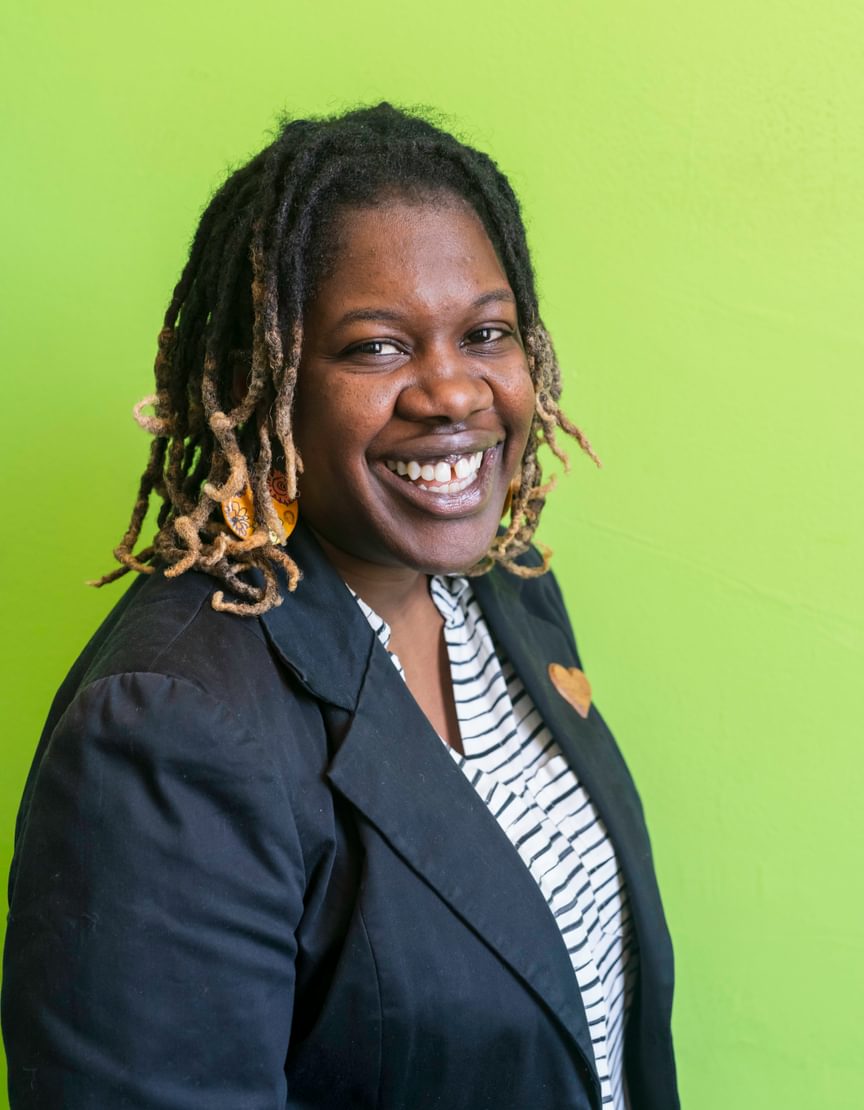
September 29, 2020
Finding power in numbers
Desiraé Simmons ’01 takes on social and environmental justiceby Rita Savard
If there’s a progressive cause to champion, Desiraé Simmons will be there to back it with an amalgam of races, ages, cultures, and religions.
As co-director of Interfaith Council for Peace and Justice (ICPJ), an Ann Arbor, Michigan–based activist organization emphasizing social and environmental justice, Simmons takes on a series of knotty issues: racial and economic justice, affordable housing, immigration and refugee advocacy, climate change, and bystander intervention training—and that’s only scratching the surface.
Founded in 1965 to resist the Vietnam War, ICPJ has successfully liaised between the community and local and state governments to become an agent of change in Washtenaw County. Building power within the community, says Simmons, is directly linked to the diversity of the community itself.
“Every denomination, every local organization representing Pride, Black Lives Matter, interfaith unity, and bisexual, transgender, and nonbinary persons—everyone is welcome, and all of us make the community stronger and richer.”
Allied with churches, synagogues, mosques, and other houses of worship, ICPJ inspires, educates, and mobilizes with the aim of empowering people to take action and make a material difference in their communities. Some of the larger issues that the organization is tackling this year include working with local law enforcement to stop racial profiling, creating affordable housing, and raising money to free a contingent of 20 female immigrants detained in a Michigan ICE facility.
“There is a tremendous amount of power and hope that comes when members of a community organize themselves to pursue a shared vision,” Simmons says. “Fundamentally, when people are leaning into their best selves and into these loving shared spaces we create together, it stimulates their sense of fairness and justice—and makes them believe in their own power to influence change.”
Justice means that everyone has what they need, and that people don’t get what they want at the expense of others.
”Confronting Systemic Racism
George Floyd. Breonna Taylor. Ahmaud Arbery. Laquan McDonald. Aura Rosser. Eric Garner. Michael Brown. Sandra Bland. The list of names tragically goes on. They are among millions of Black Americans who haven’t received the constitutional guarantee of equal protection under the law granted by the 14th Amendment. Their justice has not been equal justice.
In a June silent bike ride for Black Lives Matter, Simmons told a crowd of nearly 1,000 in Ann Arbor: “We need change now.”
“When I say Black lives matter, it means different things to different folks,” Simmons says. “When I say Black lives matter to non-Black folks, I’m saying I need you to love me as much as you love yourself…that you see me; that you’re here with me.”
That kind of love, Simmons adds, can be seen and felt when awareness transforms into action—action that leads to impactful and tangible change. Working with the grassroots community organization Liberate! Don’t Incarcerate, Simmons is drumming up support to address racial inequality at the root cause—within her community’s criminal justice system.
This November will mark the first time in 30 years that a new county prosecutor will be elected to office. To move away from the country’s mass incarceration system and toward restorative justice, Simmons says systemic changes must take place in how the prosecutor’s office and the courts function.
Looking at Washtenaw county’s $120 million budget, for example, approximately 42 percent (around $50 million) goes to the sheriff’s department, while only 2.6 percent is allocated for the health department.
“What does public safety look like to you?” Simmons asks. “I am tired of funding my own oppression. We have to put our money where our mouth is to show what it means to love all people.”
Thanks to a strong grassroots push from community organizers like Simmons, reformist candidate Eli Savit won a three-way primary race for Washtenaw County prosecutor on August 4. Savit, whose campaign highlighted the importance of breaking down racial and socioeconomic inequity issues, advances unopposed to the November general election.
“I’m excited that Washtenaw County has an opportunity to actually systematically change our criminal legal system,” Simmons says. “Things that were impossible before are suddenly possible. We cannot rest on electing a progressive prosecutor; it is up to us to push for everything and more.”
Other Stories
Andover’s vision for creating a pipeline of rising leaders.




